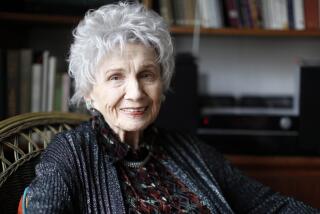Still thinking ‘About Alice’
- Share via
Last spring, the 71-year-old writer and humorist Calvin Trillin published a piece in the New Yorker about his late wife, Alice, five years after her death. Trillin’s readers were well acquainted with Alice from books such as “Alice, Let’s Eat,” in which she appeared as the sensible straight woman to his charmingly raffish foodie. But this was something different. In his understated way, Trillin conveyed the strength of their long romance and the heartbreak of her death from cardiac failure at age 63, after having undergone radiation treatments for lung cancer years earlier.
In telling the real story of Alice’s life, Trillin also painted a portrait of himself as an ardent husband who never quite came around to believing his luck in landing Alice. So many readers wrote to Trillin to tell him how the piece moved them, even to thank him for renewing their faith in marriage, that Random House issued it this month as a slim book, “About Alice.” Now it’s book reviewers who are marveling at its unexpected emotional power. From his longtime home in New York’s Greenwich Village, Trillin talked by phone about the response to “About Alice.”
*
-- Maria Russo
*
I’M not sure I can account for it. I was trying to write about Alice and I suppose you’d say correct the record in a way, of her being presented as a sort of sitcom character in some of the lighter pieces I’d done. If you’re writing about something that’s very close to you -- the person you’re married to -- you’re not always aware of how that differs from other people’s experience.
I write a lot of different kinds of things. Most of the things I’ve written are fairly straightforward. Reporting pieces, humor, comic novels poetry -- I don’t think about any of them when I start out, “Now I have to push into that mode.” The subject sort of finds what the writing is. So with this one I didn’t really think of it as something different. But apparently it did come out different.
I was a little surprised -- I wasn’t surprised to get letters, when the original piece was in the New Yorker, from widows or widowers -- but I was surprised to get letters from young women, because I didn’t really realize I was writing about that, about marriage. I just thought I was writing about Alice.
I said on a TV show the other day that I was sort of alarmed -- well, at least surprised -- to see things written about this book that said, ‘Here’s a sensitive man in touch with his feelings.’ ” I said, ‘I hope nobody I went to high school with sees those!’ I think my family would say sort of the opposite.
... I think readers can bring things that writers don’t mean. I didn’t set out to write about marriage. Or about grief. I didn’t want to dwell on that part. I guess some of that crept in. My instinct is to think people have a certain way of writing and looking at the world and putting sentences together. That’s just the way people’s minds work. In my case I’ve written some sad stories, reported pieces, and there’s usually something in them that’s ironic.
... In our family, Alice was definitely the sensible grown-up in the house, but what I tried to do was go beyond that, to the real person. I knew Alice so well that it’s not easy for me to tell what people who didn’t know her will come away with, but I hope I did capture what she was like, the various aspects of her life -- as a mother, as a teacher, but also the way she approached things, and her interest in people, which was unusual.
She was engaged in people’s lives to an extent that was unusual. She had a very active -- activist -- personality. She wasn’t somebody who ever sat without saying anything in a group conversation, and she approached things that way. And her approach to being sick was the same way. I’d say most of all that she had a lot of optimism and enthusiasm. She was an enthusiast.
More to Read
Sign up for our Book Club newsletter
Get the latest news, events and more from the Los Angeles Times Book Club, and help us get L.A. reading and talking.
You may occasionally receive promotional content from the Los Angeles Times.










